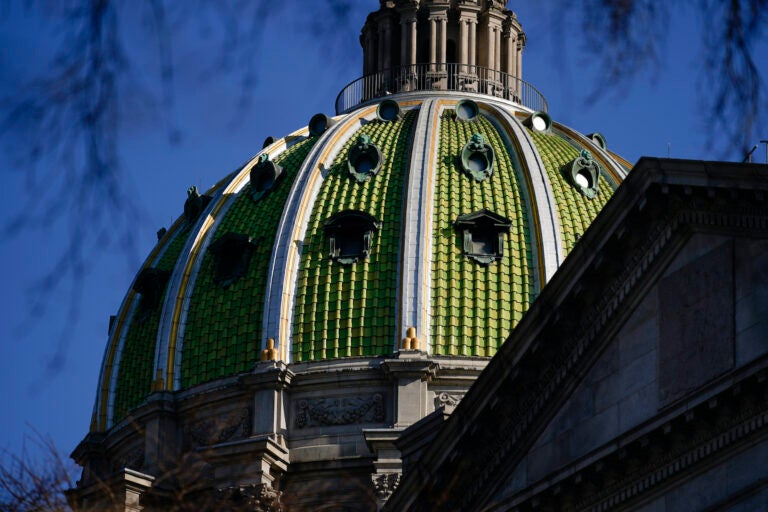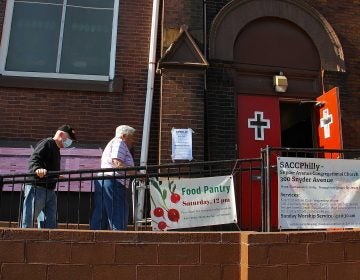Pa. voters give legislature more power to override governor during emergency declarations
Republicans in Pennsylvania have won a significant victory in their efforts to curtail a governor’s power in emergency situations.

The Pennsylvania Capitol in Harrisburg, Pa., Monday, March 22, 2021. (Matt Rourke/AP Photo)
Updated 6:00 p.m.
Republicans in Pennsylvania have won a significant victory in their efforts to curtail a governor’s power in emergency situations. Two constitutional amendments that would give the legislature more power to block emergency declarations have officially passed statewide referenda.
Ballot questions almost always pass. But this passage, which the Associated Press confirmed Wednesday morning as results trickled in, was relatively narrow — when the race was called, with more than two million votes tallied, “yes” and “no” votes were within ten percentage points of each other, while two less controversial amendments had 40 point margins.
The election caps a more than year-long power struggle between Democratic Gov. Tom Wolf and the Republican-controlled state legislature over the appropriate response to COVID-19.
Republican efforts to override Wolf’s orders through the courts and through legislation — which required a two-thirds vote — failed in the past year.
One of the new laws would allow lawmakers to end an emergency order with a simple majority.
The state’s current COVID-19 emergency order, last renewed for 90 days in February, is set to expire this week ahead of business restrictions lifting on Memorial Day. It’s unclear at the moment if Wolf intends to renew the declaration to give his administration the flexibility to extend lockdowns if cases were to suddenly rise. The other new law would limit that order to 21 days.
House Majority Leader Kerry Benninghoff (R-Centre) and Speaker Bryan Cutler (R-Lancaster) celebrated the election result and beat back concerns that the state legislature would take the opportunity to cancel COVID-19 emergency declarations without considering public health or consulting with the Governor’s office.
“We stand ready to reasonably and responsibly manage Pennsylvania through this ongoing global pandemic, the scourge of opioid addiction, and other long-term challenges that may come to face this Commonwealth,” they said in a statement.
Senate Republican leaders have characterized the effort as a way to ensure the legislature and governor’s office talk to each other more often during emergencies.
“This decision by the people is not about taking power away from any one branch of government,” Majority Leader Kim Ward (R-Westmoreland) and Senate President Jake Corman (R-Centre) said in a joint statement. “It’s about re-establishing the balance of power between three equal branches of government as guaranteed by the constitution.
A spokesman for Gov. Wolf said the administration declined to comment until the official results come in. The Pennsylvania Emergency Management Agency released a statement criticizing the decision.
“The constitutional amendments have the potential to politicize future disasters and their management. PEMA always stands ready to respond to any situation but we’re extremely disappointed that our efforts, and the efforts of our other state agencies, could be constrained by partisan politics, which has no place in emergency response efforts.”
Also confirmed Wednesday was the result in a three-way GOP primary election for the single open state Supreme Court seat. Commonwealth Court Judge Kevin Brobson, who lives in the Harrisburg area, had an unsurprising win. He had the state Republican Party’s nomination, and ahead of the primary had significantly more cash on hand than either of his opponents, Philadelphia Common Pleas Judge Paula Patrick or Pittsburgh-area Commonwealth Court Judge Patricia McCullough.
Even as major down-ballot races were decided — including Philadelphia DA Larry Krasner cruising to a victory that will almost certainly get him a second term, and state Rep. Ed Gainey’s upset victory over Pittsburgh Mayor Bill Peduto — a few statewide judicial races remained uncalled Wednesday morning.
The delay is nowhere near what the commonwealth saw after 2020’s historically complicated and high-turnout presidential election, but several statewide races still remain too close to call.
Wanda Murren, a spokeswoman for the Department of State, said some precincts still haven’t reported results, and that DOS was still waiting for updates from several counties Wednesday evening. She estimated around 250,000 mail ballots still had to be counted.
As it stands, counties have tabulated more than two million total votes from both mail and in-person ballots, about 23% of the commonwealth’s registered voters. Even with a number of ballots uncounted, it easily outstrips the 1.45 million ballots DOS says were cast statewide in the 2017 primary, and the 1.7 cast in the 2019 primary.
Some of the delays in counting were due to scattered issues with the voting process.
The machines that slice open Philadelphia’s mail ballots malfunctioned, slowing down returns, for instance. Several York and Delaware County precincts ran out of ballots, Lancaster County was forced to count 15,000 ballots by hand due to a printing issue, and some Luzerne County voting machines showed a graphic for the wrong political party.
But Acting Secretary of State Veronica Degraffenreid said things had gone smoothly overall. The day’s election, she said, was “indeed successful” and there were “no widespread incidents to report.”
But she added, she thinks the process can still be smoothed out and sped up. State and county election officials have been pushing lawmakers to allow mail ballots to be processed ahead of Election Day to speed results and require less scrambling on the part of election workers.
The judicial races
Candidates for several open spots on the commonwealth’s three appellate courts were at the top of ballots across Pennsylvania.
Seats on the Supreme, Superior and Commonwealth courts are some of the most powerful in state government. Judges on all three are elected to 10-year terms, and can then be reelected in yes-or-no retention elections, which they almost never lose. Once a judge is on the bench, they generally stay there until they hit the mandatory retirement age of 75.
Going into this primary, there were three Republicans and one Democrat vying for a single open Supreme Court seat, one Republican and three Democrats in the running for a Superior Court seat, and two Republicans and four Democrats running for two Commonwealth Court seats.
With Brobson’s victory in the GOP Supreme Court primary confirmed, the parties will now look ahead to — and raise money for — a competitive general election on Nov. 2. Brobson will face
Philadelphia’s Maria McLaughlin, the sole Democratic candidate on the ballot. She’s currently a Superior Court justice. Even if McLaughlin loses the general election to her eventual GOP challenger, it won’t change the balance of the court, which is currently made up of five Democrats and two Republicans. The best the GOP can hope for is to maintain that balance — the retiring justice this election is replacing was a Republican.
The Democratic Superior Court primary is closer. And unlike the Supreme race, the general election for the lower court will actually have a material effect on its partisan makeup. The current bench has seven Republicans, seven Democrats, and one vacancy.
On Wednesday morning, two of the Democratic candidates — Pittsburgh civil litigator Jill Beck and Philadelphia Common Pleas Judge Timika Lane — were handily beating commercial lawyer Bryan Neft, of Mt. Lebanon. Lane had a nearly seven-point lead.
Whoever wins will face Megan Sullivan. The lone Republican in the race is based in Paoli, and was a Deputy Attorney General for the commonwealth.
In the Democratic primary race for two Commonwealth Court seats, Philadelphia Common Pleas Judge Lori Dumas, Allegheny County Common Pleas Judge David Spurgeon, and former Allegheny County Council member Amanda Green-Hawkins were all within a few points of each other, with a lead over Philadelphia Common Pleas Judge Sierra Street.
There are two Republican candidates for the two seats, though one is a relatively rare judicial incumbent running in a partisan election. Drew Crompton, an attorney and former top Senate GOP aide, was appointed to the court by Gov. Tom Wolf to fill a vacancy in 2019. He now has to run for reelection to win a full 10-year term.
Republican Stacy Wallace, a Bradford attorney, is running for the second open seat.
The other ballot questions
The other two amendments on the ballot Tuesday were on track to pass easily.
One would update the state constitution to specifically ban racial and ethnic discrimination. Both state and federal law already prohibit the practice in nearly every legal arena, but the Attorney General’s office described the measure as a failsafe against any future discriminatory state or federal laws.
The other is a referendum asking voters to allow the state’s 94 paid and volunteer/paid combination fire departments to apply for loans to help with equipment and apparatus purchases.

Get more Pennsylvania stories that matter
WHYY is your source for fact-based, in-depth journalism and information. As a nonprofit organization, we rely on financial support from readers like you. Please give today.







